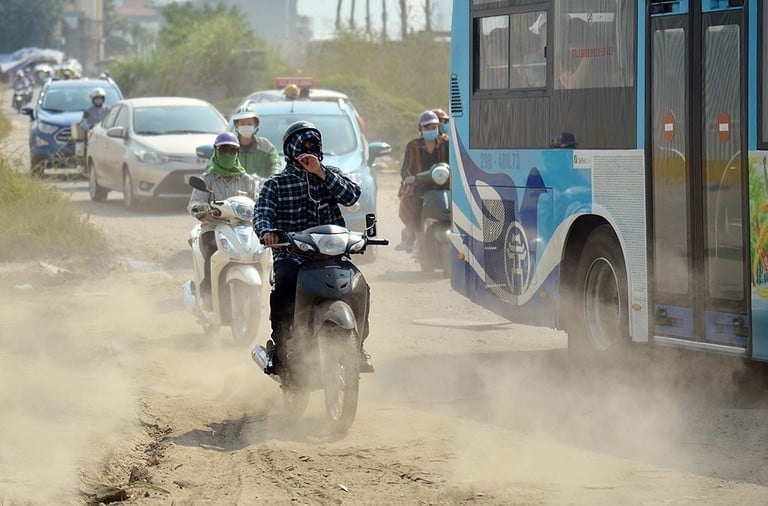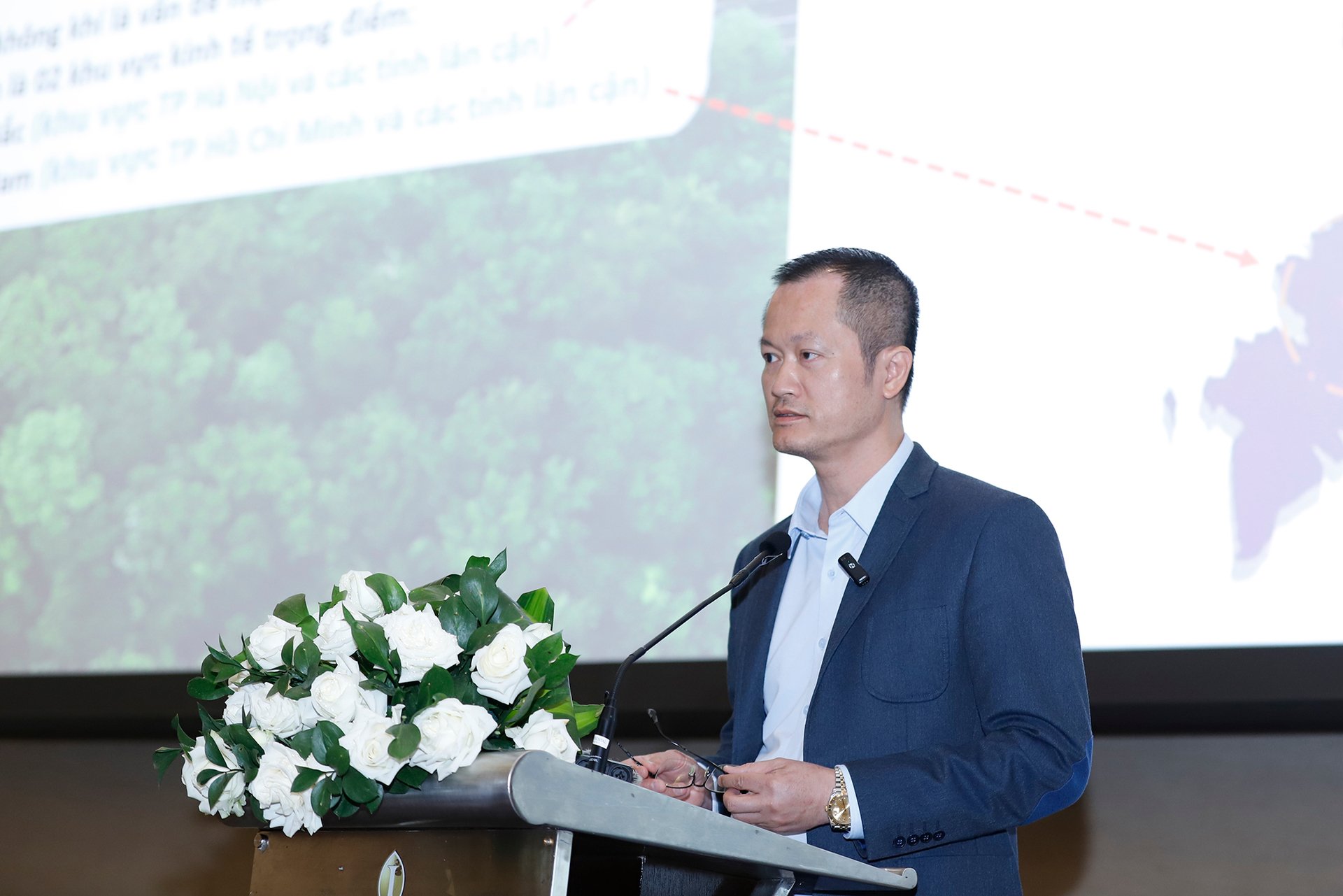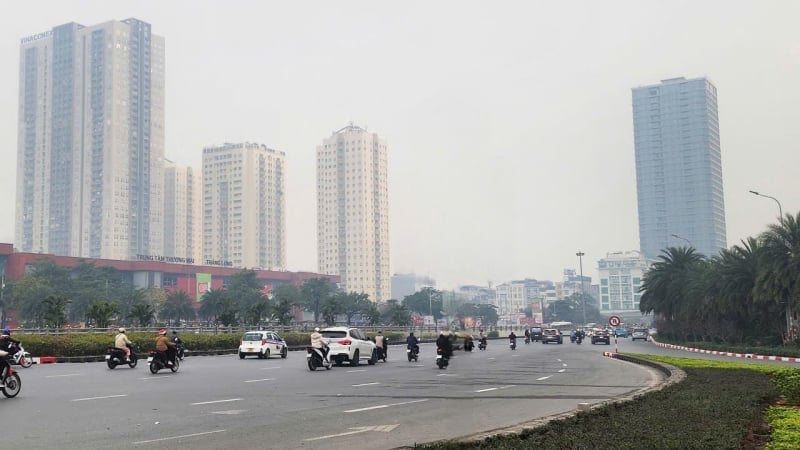May 30, 2025 | 08:39 GMT +7
May 30, 2025 | 08:39 GMT +7
Hotline: 0913.378.918
May 30, 2025 | 08:39 GMT +7
Hotline: 0913.378.918
At the National Scientific Workshop on Combating air pollution and improving air quality in Vietnam, held on April 24 and organized by the Ministry of Agriculture and Environment, leading experts and scientists stated that while the causes of pollution have long been identified, conducting an emissions inventory is essential to “treat the root cause".
Associate Professor Dr. Ho Quoc Bang, from Vietnam National University – Ho Chi Minh City, emphasized that emissions inventories serve as a crucial “diagnostic” tool for determining the sources of pollution. By collecting and analyzing data on emission sources and volumes across different regions, inventories help monitor emission trends over time and support the creation of emission maps for more effective management.

Transportation is the largest source of emissions causing air pollution. Illustrative image.
Statistics show that in 2022, Hanoi had a population of 8.4 million, with 6.091.986 motorcycles, 686.755 automobiles, and nearly 2.000 industrial facilities generating emissions. Meanwhile, Ho Chi Minh City had nearly 9 million residents, 7.339.522 motorcycles, 637.323 cars, and 2.708 emission-generating factories.
“With regard to road traffic, motorcycles are identified as the primary source of emissions for most pollutants", noted Assoc. Prof. Dr. Ho Quoc Bang.
According to Dr. Bang’s analysis, in the capital city of Hanoi, transportation is the largest source of emissions, contributing 87%, 92%, 57%, 86%, 96%, and 74% of NOx, CO, SO₂, NMVOC, CH₄, and PM2.5, respectively. Among these, emissions from motorcycles consistently accounted for the largest share.
This situation is mirrored in Ho Chi Minh City, where motorcycles are also the main contributors, responsible for 97.8% of CO, 42.9% of NMVOC, 71.8% of CH₄, 37.7% of SO₂, 69.2% of NOx, and 18% of PM2.5 emissions.
In identifying the key causes of air pollution, policymakers and scientists have come together to discuss and propose potential solutions.

Deputy Director of the Environment Department Le Hoai Nam, proposed various solutions to reduce air pollution at the conference. Photo: Khuong Trung.
Mr. Le Hoai Nam, Deputy Director of the Department of Environment under the Ministry of Agriculture and Environment, shared that the Ministry is actively reviewing and advising on the development of strategic, long-term policies aimed at improving air quality. These include the effective implementation of the National Air Quality Management Plan as well as the Provincial Air Quality Management Plans, which have already been approved.
A key element is the establishment of an extensive network of automatic, continuous air monitoring stations. These stations will be large enough to ensure accurate data collection, transmission, and reception, which will enable government agencies to monitor, supervise, issue early warnings, and forecast trends in air quality and pollution levels. Such measures will significantly enhance the ability to manage air quality more effectively.
In the short term, regarding air pollution caused by transportation, Mr. Nam emphasized that "Emission standards for vehicles are being tightened". He explained that the Department is currently considering the development of specific emission standards for both cars and motorcycles. Additionally, one important strategy to alleviate both air pollution and traffic congestion is the creation of restricted zones for personal vehicles during peak hours, especially in densely populated urban areas and city centers.
In addition to these measures, the Ministry plans to strengthen inspection and enforcement activities. This will involve monitoring and addressing various sources of pollution, particularly those from industrial facilities, open burning sites, waste incineration, biomass burning, agricultural waste such as straw and stubble, and construction sites.

Air pollution in Hanoi. Photo: Hoang Hien.
At the same time, green solutions must also be considered, such as accelerating investment and transitioning from fossil fuels to renewable energy sources like solar power, wind energy, and small hydropower. The development of "smart cities" with automated transportation systems and technology is essential to better control emission levels from socio-economic activities.
To ensure the effectiveness of these solutions, according to Ms. Nguyen Hoang Anh, a representative from the working delegation, it is necessary to establish a mechanism for inter-sectoral and inter-regional collaboration.
"Especially, this should be incorporated into the Government's regulations to ensure the consistent and synchronized implementation of these solutions. Furthermore, air quality management should be based on scientific and technical tools to identify pollution sources, as well as to strengthen the connection between scientists, working towards the common goal of a cleaner air environment", Ms. Anh proposed.
The United Nations Development Programme (UNDP) and the World Health Organization (WHO) are committed to closely collaborating with the Ministry of Agriculture and Environment to develop policy frameworks and regulations for air quality management. At the same time, they will provide technical support for air quality monitoring, forecasting, and early warning systems, as well as for environmental projects in Vietnam.
Translated by Phuong Linh

(VAN) Ms. Nguyen Thi Dung, Deputy Director of Ngoc Hoang Cooperative, shared about the journey of bringing dragon fruit to Europe, achieving annual revenues in the billions of VND.

(VAN) Bamboo products from Thang Tho Bamboo Cooperative have reached many countries around the world, while also creating jobs for local workers.

(VAN) The Management Board of Con Dao National Park reported that a green sea turtle, tagged in the Philippines, has traveled thousands of kilometers to lay 84 eggs on Bay Canh Islet.

(VAN) Green technology is paving a new path for sustainable aquaculture in the Mekong Delta in particular and across the country in general, helping reduce emissions and adapt to climate change.

(VAN) On May 27, La French Tech Vietnam (the French startup and innovation community in Vietnam) held the French Tech Summit Vietnam 2025.
/2025/05/27/4731-2-223159_980.jpg)
(VAN) No votive paper, no styrofoam, no plastic bags, no plastic bottles, and no single-use plastic trays are the key rules tourists should keep in mind when visiting Con Dao.

(VAN) In the fight against plastic pollution, Vietnam has been demonstrating a proactive, pioneering, and active role in addressing the greatest environmental challenge today.